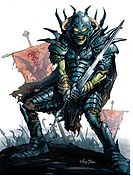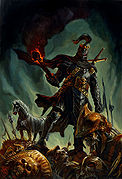Death knight: Difference between revisions
mNo edit summary |
m (→References) |
||
| Line 32: | Line 32: | ||
==References== | ==References== | ||
* {{cite|title=Dragon #290|pagenum=pp.100-103}} | * {{cite|title=Dragon #290 - The Death Knights of Oerth: Part One|pagenum=pp.100-103}} | ||
* {{cite|title=Monster Manual II|pagenum=pp.207-209}} | * {{cite|title=Monster Manual II|pagenum=pp.207-209}} | ||
[[Category:Undead]] | [[Category:Undead]] | ||
Revision as of 21:16, 20 November 2010
Pathfinder |
One of the rarer undead beings, death knights are the physical representation of the betrayal of ones' principles in the name of pride or anger, a creature that while once good, has far fallen from grace, and seeks to destroy all they once believed in in the name of their foul patron. Dark champions, these beings are nothing more than a perversion of the ideals of knights, both in form and in attitude.
History
Death knights are a somewhat recent undead creation compared with other forms, first recorded merely 375 years ago. The first death knight was the result of a pact between the abyssal lord Demogorgon and Sir Kargoth of Oerth, a member of the Knight Protectors seeking vengeance against a fellow knight for a humiliating loss of honor resulting from a failed duel. Others soon were to follow on that world, and within days he was joined by thirteen of his fellow knights in undeath, a collection that, in the name of Demogorgon, still wreaks havoc upon that realm to this day.
It was mere years after this event that Lord Soth of Krynn was similarly afflicted, though in his case it was a divine curse placed upon him by the gods of that realm as punishment. His position on that world as one of its supreme evils quickly led to the association of the death knight "race" with the world of Krynn, but his popularization has led to further repetition of Demogorgon's original feat across the Prime. At present, hundreds if not thousands of death knights exist throughout the multiverse, a rare but powerful "breed" of undead.
Ecology
Death knights are created as the result of a dark ritual, one draining enough that it can only reliably be performed by a powerful fiend or divine entity. This ritual is sometimes by the request of the subject, but at other times is inflicted as a "reward" for their horrific deeds. A person can only be subject to the death knight ritual if they once fought with force of arms in the name of good, but have since performed an act of supreme evil. Any such individuals are a potential subject for the ritual, but the most powerful by far are those created from fallen paladins; such death knights almost always possess the powers of a blackguard in addition to their innate undead abilities.
While death knights can be found in the service of anyone with the ability to create them, Demogorgon, as their original progenitor, still has the largest number of them in his service, counting dozens of these undead beings in his ranks. XXXXXX was also known to have a dozen of these beings serving him in Thanatos prior to his death. In general, however, these numbers are fairly high - most have perhaps one or two death knights in their service at best, suggesting to some that the creation of a death knight requires a high investment of power on the part of the creator.
Appearance
Much like a lich, a death knight appears as a well-preserved but ancient corpse, usually wielding darkened plate armor over their form and a massive broadsword. Abyssal fire burns in their eyes, and their voices tend to have a deep, resounding tenor, even more so than they held in life; a near parody of the charismatic, commanding tone held by the most experiences knights. Death knights are usually accompanied by dozens of lesser undead, drawing them to themselves like squires. They also bear a connection to nightmares, using them as mounts and even calling them to themselves much as a paladin.
Hearkening back to their living days, many death knights still carry themselves with the nobility they held before their curse. They will present themselves with the etiquette and manners of a true knight, with many holding vast manors or keeping populations of serfs under tyrannical rule. This faux-noble facade, however, quickly crumbles under the innate aggressive tendencies of the death knight when tested, to their great frustration. While the majority act in such a manner, a few death knights instead abandon all pretenses of their former state, becoming near-hedonistic and indulging in all they denied themselves in life in the name of their oaths.
Gallery
| Images of death knights | |||||||||
| |||||||||
References
- Dragon #290 - The Death Knights of Oerth: Part One, pp.100-103
- Monster Manual II, pp.207-209

